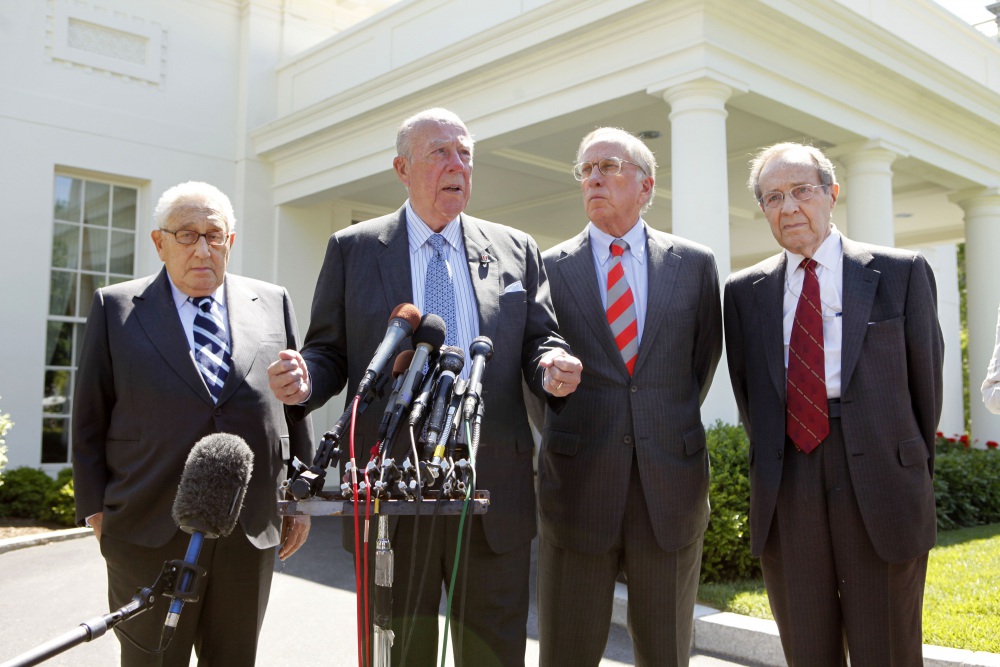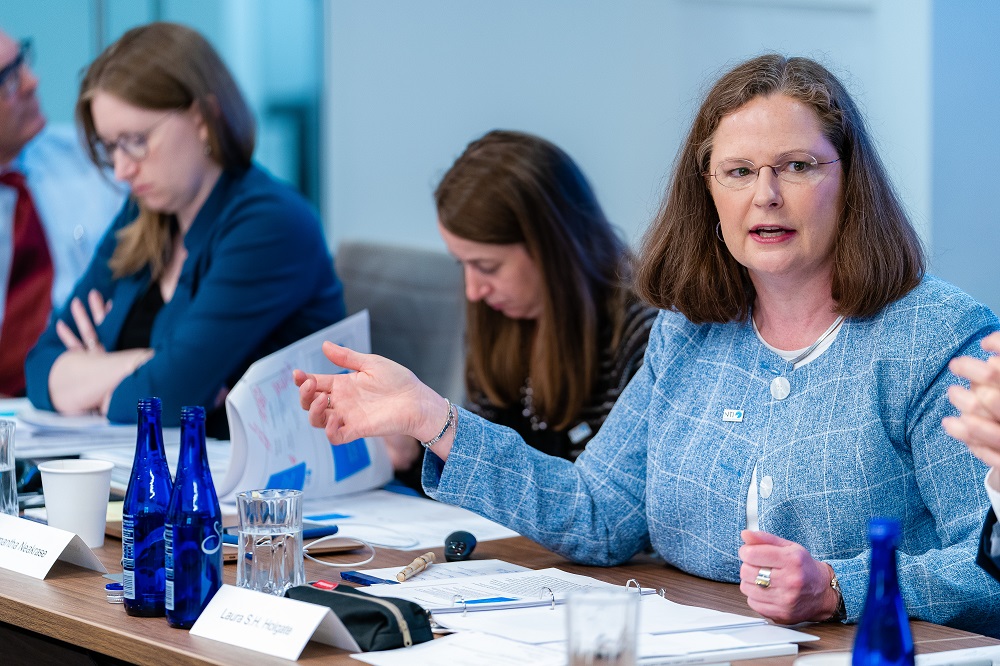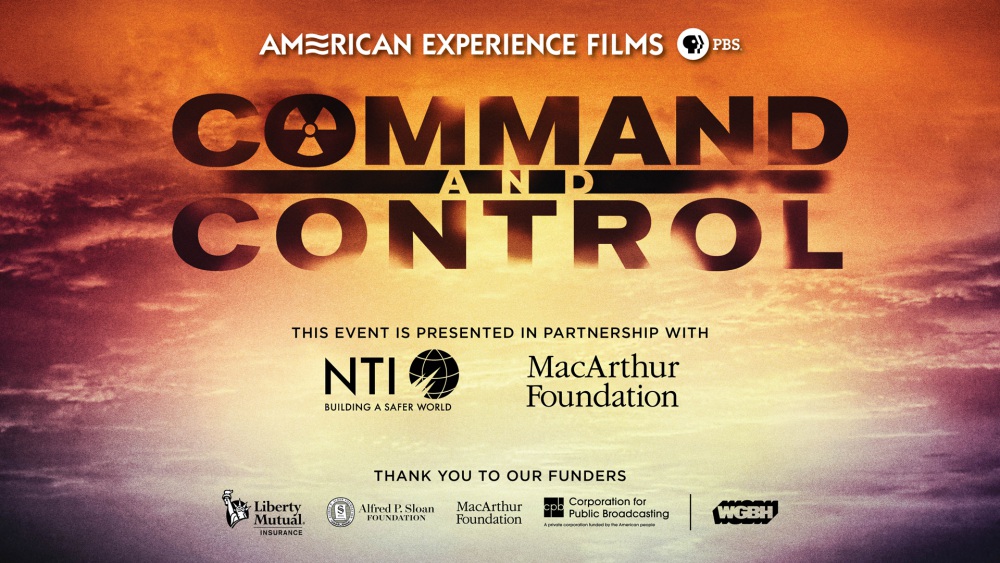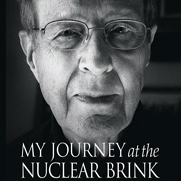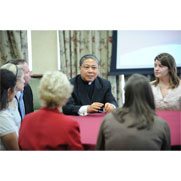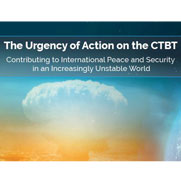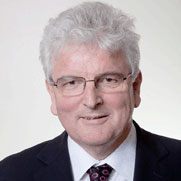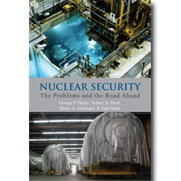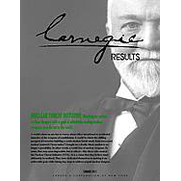
Steve Andreasen
National Security Consultant
Political leaders and citizens view nuclear threat reduction and nuclear disarmament as implausible or impossible goals.
Four senior US statesmen with deep national security credentials – former Secretary of State George P. Shultz, former Secretary of Defense William J. Perry, former Secretary of State Henry A. Kissinger and former Senator Sam Nunn – joined together in 2007 to form the Nuclear Security Project (NSP).
Leaders from around the world, including former Secretary of State Colin Powell, President Barack Obama, and the United Nations Security Council, have endorsed the vision and steps laid out by the Nuclear Security Project.
In 2007 former Secretary of State George P. Shultz, former Secretary of Defense William J. Perry, former Secretary of State Henry A. Kissinger and former Senator Sam Nunn joined together to form the Nuclear Security Project – a major effort to galvanize global action to reduce urgent nuclear dangers and build support for reducing reliance on nuclear weapons, ultimately ending them as a threat to the world.
Building on ideas set forward in a series of Wall Street Journal op-eds, by Shultz, Perry, Kissinger and Nunn, the Project links the vision of a world free of nuclear weapons with urgent steps that can be taken immediately to reduce nuclear dangers.
Recognizing that progress requires international consensus and action, the Project is designed to motivate governments to rethink policies, change direction and act on the steps that will reduce the risk of a nuclear weapon being used anywhere on the globe. To achieve these goals, NSP activities have included high-level conferences; studies that reach government decision-makers and experts; speaking engagements by the four principals; and the production of a major documentary about the principals, their vision and the steps.
Over two thirds of living former U.S. Secretaries of State, Secretaries of Defense and national security advisors endorsed the initiative. Articles and opinion pieces by other senior statesmen from around the world and across party lines turned the call of the American four into a global dialogue. The four NSP principals also inspired the creation of networks of regional leaders around the globe working to generate momentum for reducing reliance on nuclear weapons and the risks they pose in their regions.
The Nuclear Threat Initiative serves as coordinator of the NSP, in cooperation with Stanford University’s Hoover Institution.
At the IAEA General Conference, the Centre for Science & Security Studies at King’s College London released their Nuclear Security Briefing Book.
Teaching guides on nuclear security, analytic reports and cyber nuclear security, infographics, films, tutorials and more.
These papers were prepared by NTI experts for the 2016 IAEA International Conference on Nuclear Security.
Past Event
University of Notre Dame London Global Gateway, 1-4 Suffolk Street SW1Y 4HG (near Trafalgar Square)
In her latest blog post, NTI President Joan Rohlfing discusses the importance of the entry into force of a critical amendment to the Convention for the Physical Protection of Nuclear Materials.
Past Event
The E Street Cinema 555 11th St NW Washington, DC
Past Event
The George Washington University - Lehman Auditorium 800 22nd St, NW, Washington, DC
Past Event
1st Floor Conference Room, 1777 F Street NW, Washington, D.C
Past Event
Teleconference
Past Event
Carnegie Council for Ethics in International Affairs
Past Event
Trusteeship Council, UN Headquarters, New York
Past Event
Washington DC
High-profile global leaders and experts from five continents will gather in Buenos Aires on November 20-21 to address today’s nuclear security concerns, engage policy makers and raise awareness about nuclear risks.
Past Event
UN Headquarters - New York
A new book authored by George Shultz, Sam Nunn, Sidney Drell and Henry Kissinger offers recommendations to control nuclear weapons and ensure the safety of the nuclear enterprise.
Leaders from four regional leadership networks will meet next week in Singapore to address urgent global nuclear threats and outline key steps to reduce nuclear dangers around the world.
More than 30 high-profile global leaders and experts from 18 countries on five continents will gather in Singapore on June 25 and 26 to address urgent global nuclear threats and outline key steps to reduce dangers around the world.
WANO and WINS will establish a joint Working Group to identify best practices for managing the intersection of nuclear safety and nuclear security.
The Carnegie Corporation of New York featured NTI's work in a recent issue of its Results publication.
Past Event
The Newseum, Washington, DC
Senator Sam Nunn speaks with Andrea Mitchell about the accomplishments achieved at the Nuclear Security Summit.
Past Event
The White House, Washington, DC
Past Event
Los Angeles, CA
NTI supports the Nonproliferation for Global Security with a grant to support public education regarding nuclear dangers.
